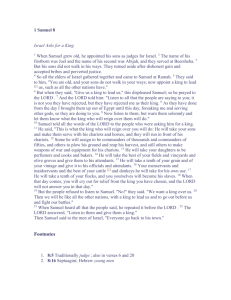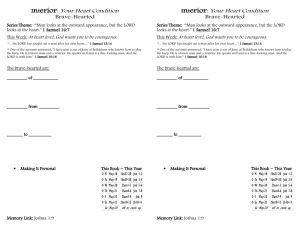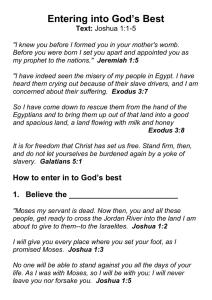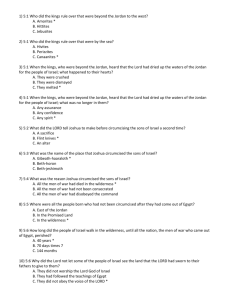Old Testament Survey Part One
advertisement
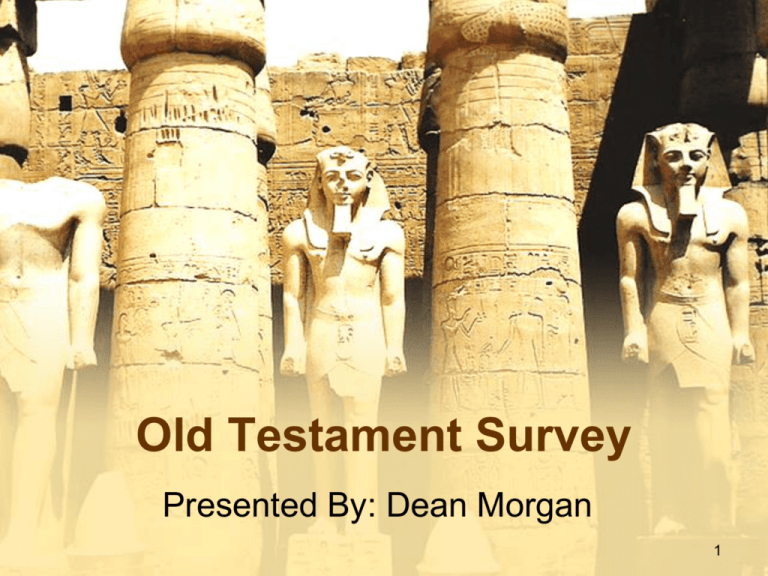
Old Testament Survey Presented By: Dean Morgan 1 Introduction • berith • diatheke • The Old Testament revealed in the New, the New veiled in the Old—St. Augustine. • The New is in the Old contained, and the Old is in the New explained. 2 God’s Word Is Living And: 1. Indestructible: Matthew 24:35 2. Incorruptible: 1 Peter 1:23-25 3. Indispensable: Deuteronomy 8:3; Matthew 4:4; Job 23:12 4. Infallible: Matthew 5:18 5. Inexhaustible: Psalm 92:5 3 Introduction • Central theme: Salvation through Jesus Christ. • From Adam to Abraham we have the history of the human race. • From Abraham to Christ we have the history of the chosen race. • From Christ on we have the history of the church. • Subject of the Bible: Redemption 4 Introduction: Purpose of the Bible 1. To Provide a foundation for our faith: Romans 10:17. 2. To make us wise unto salvation: 2 Timothy 3:15. 3. “For doctrine, for reproof, for correction, for instruction in righteousness, that the man of God may be perfect, thoroughly furnished unto all good works” 2 Timothy 3:1617. 5 Introduction • You can read the Bible through in 72 hours and 40 minutes. • The Old Testament in 52 hours and 20 minutes. • The New Testament in 18 hours and 20 minutes. • The Psalms in 4 hours. 6 Introduction: Views of the Bible 1. The liberal view. 2. The Existentialist or NeoOrthodoxy view. 3. The Historic and Evangelical view. 4. The Neo-Evangelical view. 7 Introduction: The Bible • • • • • • It is Verbal It is Unbreakable It is Irrevocable It has Final Authority It is Plenary It has complete Inerrancy 8 Introduction: Definitions • Translation: A translation is simply the rendering of a given composition from one language to another. • Literal Translation: It is one that expresses, as far as is possible, the exact meaning of the original words. It is a word-for-word translation and therefore is more rigid in its renderings than a mere translation. 9 Introduction: Definitions • Version: is a translation from the original language of a literary text into another language. • Revisions or Revised Versions: these are works that are actually translated from one language, usually the original, and have been carefully and systematically reviewed and examined for the purpose of correcting errors or making other necessary emendations. 10 Introduction: Definitions Paraphrase: they are free translations or restatements of sentences, passages, or works in an attempt to keep the original sense of the text while expressing its meaning more fully or clearly than could be done by a more literal translation. 11 Original Language • οὕτω γὰρ ἡγάπησεν ὁ Θεὸς τὸν κόσμον, ὥστε τὸν υἱὸν αὐτοῦ τὸν μονογενῆ ἔδωκεν, ἵνα πᾶς ὁ πιστεύων εἰς αὐτὸν μὴ ἀπόληται, ἀλλ᾿ ἔχῃ ζωὴν αἰώνιον. (John 3:16 GNT) • (Genesis 1:1 HOT) בראׁשית ברא אלהים את הׁשמים ואת הארץ׃ 12 Introduction • The divisions of the Bible were arranged in 1550 by Robert Stephens, a printer of Paris. • The longest chapter is Psalm 119, and the shortest, and middle, is Psalm 117. The longest verse is Esther 8:9, and the shortest is John 11:35. The middle verse in Scripture is Psalm 118:8. • Ezra 7:21 contains all the letters of the alphabet except j. 13 12 Principle Places Of The O.T. 1. 2. 3. 4. 5. Eden Ararat Babel Ur of the Chaldees Canaan (with Abraham) 6. Egypt (with Joseph) 7. Sinai 8. Wilderness 9. Canaan (with Joshua) 10.Assyria (captivity of Israel) 11.Babylon (captivity of Judah) 12.Canaan (Palestine—return of the exiles) 14 Introduction: Bible Study • First, the Bible must be studied with an open mind, and a heart receptive to its message. • Second, the Bible should always be studied with the thought in mind that the Book is its own best interpreter. • Third, different translations or versions will be found helpful in determining the meaning of the original. 15 Introduction: Bible Study • Fourth, personal interpretations ought to be checked by reference to some of the leading commentaries. • Fifth, no one can hope to make any kind of systematic personal study of the Bible without frequent recourse to concordances. • Finally, there will be occasions when the careful Bible student will wish to make use of biblical encyclopedias or 16 dictionaries, and a biblical atlas. Genesis The Book Of Beginnings 17 Genesis • The book is called “in the Beginning” by the Jews. • It tells us the beginning of everything except God. • Genesis gives us at least 2,000 years of record. • Subject: God’s works and ways in restoring a ruined earth and His ways with seven men: Adam, Abel, Noah, Abraham, Isaac, Jacob, and Joseph. 18 Genesis • Purpose: To introduce to us (typically) God’s purpose and plan in redemption. • Writer: Moses • To Whom Written: Israel in particular; mankind in general. • Key Chapters: 1, Creation; 12, Abraham’s call. 19 Genesis • Key Verse: 1:1 • Key Word: Beginning • Key Thought: The book of beginnings. • Key Phrase: In the beginning • Spiritual Thought: Begin with God. 20 Genesis – 3 Word Outline 1. Generation—In the beginning God (1:1) 2. Degeneration—Now the serpent (3:1) 3. Regeneration—Now the Lord (12:1) 21 Exodus The Book Of Departure From Egypt 22 23 Exodus • Exodus = “departure” • Exodus is preeminently the book of redemption in the Old Testament. • Subject: Israel’s bondage, deliverance, and their relation to God. • Purpose: To teach us the necessity, method, and the result of God’s purpose in redemption. 24 Exodus • Scope: The Exodus events cover a period of approximately 145 years. • Writer: Moses • To Whom Written: Israel; to the believer • Where Written: In the wilderness • Key Chapter: 12. The Passover. • Key Verse: 12:23 25 Exodus • Key Word: Redemption. • Key Phrase: Pass over you • Key Thought: The making of a nation. • Spiritual Thought: Come out for God. 26 27 Exodus: The Tabernacle • For Israel, the Tabernacle was instituted for the purpose of revealing through object lessons God’s plan of redemption for every believing Israelite. • For us, the Holy Spirit has recorded the things concerning the Tabernacle to illustrate the work of redemption which has been accomplished by our Lord Jesus. 28 Exodus 1. The Foundation – Atonement Money 2. The hangings of the court 3. The Gate 4. The Brazen altar 5. The Laver 6. The Door 7. The Veil 8. The Candlestick 9. The Table of Showbread 10.The Golden Altar 11.The Ark 12.The Mercy Seat 29 Leviticus The Book Of Atonement 30 Leviticus • Leviticus means “The Lord Called.” • It deals primarily with: the Levitical Priesthood, the services of the priests, and the law of sacrifice. • Subject: The acceptable way of approach unto a Holy God for Israel and the holy walk becoming them as an accepted people. 31 Leviticus • Purpose: To teach us the only acceptable way of approach unto a Holy God, and the holy walk becoming us as an accepted people. • In Genesis we see man ruined. • In Exodus, man is redeemed. • In Leviticus, man worshiping. 32 Leviticus • Leviticus is God speaking to us through the Tabernacle and its meaning. • Writer: Moses • To Whom Written: Israel in general; the Levites in particular. • When and Where Written: About 1500 B.C., in the wilderness • Key Chapter: 16. Day of Atonement. 33 Leviticus • Key Verse: 19:2 • Key Words: Holiness, found 87 times; Holy found 65 times. • Key Phrase: “You shall be holy; for I am holy”: • Key Thought: The Laws of the Nation. • Spiritual Thought: Get right with God. • Christ Is Seen As: Our Great High Priest 34 Leviticus a. The Passover b. Unleavened Bread c. First Fruits d. Pentecost e. Trumpets f. Atonement g. Tabernacles 35 Leviticus: Offerings • • • • • Burnt Offering: “Surrender” of Christ for the world – Chapter 1 Meal Offering: “Service” of Christ in life – Chapter 2 Peace Offering: “Serenity” of Christ in life – Chapter 3 Sin offering: “Substitute” of Christ for sin – Chapter 4-5:13 Trespass Offering: “Satisfaction” by Christ for demands of God – Chapter 5:14-6:7 36 Numbers The Book Of Pilgrimage 37 Numbers • Two numberings: one at Mt. Sinai (Chapter 1), and the other in the plains of Moab about 39 years later (Chapter 26). • Contents: It is the story of the wilderness wanderings of a redeemed people who failed to enter the Promised Land at Kadeshbarnea. 38 Numbers • Subject: Israel’s preparation for their wilderness journey and for entrance into the Promised Land. • Purpose: To teach us how God would lead us through the place of blessing, by belief and trust in Him. 39 Numbers • Writer: Moses • When and Where Written: About 1451 B.C., after the Israelites had reached the plains of Moab. • Key Chapter: 14. Unbelief at Kadesh Barnea. • Key Verse: 33:1 • Key Thought: The training of the nation Israel. 40 Numbers • Leviticus deals with the believer’s worship. • Numbers deals with the believer’s walk. • In Leviticus we see the believer’s privileges. • In Numbers the wilderness in the drill field. 41 Numbers: Christ Is Seen As • The Rock • The Star – prince • The Scepter – Ruler or King 42 Numbers – Use Of Trumpets A. For the Calling of the Assemblies B. For the Journeying of the Camps C. For the Calling of the Princes D. For the Blowing of Alarms E. For War or Enemy Oppression F. For Days of Gladness 43 Numbers: Use Of Trumpets G. For Solemn Assemblies H. For the Beginning of Months I. For the Offerings and Sacrifices 44 Numbers: Further Use Of Trumpets A. anointing of Kings B. Dedication of Solomon’s Temple C. great year of Jubilee D. final judgments of God and also at the second coming of Christ 45 Numbers: Cities Of Refuge a. Kadesh means holy b. Shechem, a shoulder c. Hebron, fellowship d. Bezer, a fortification e. Ramoth, high, or exalted f. Golan, joy, or exultation 46 Deuteronomy The Book Of Preparation For Possession 47 Deuteronomy • Deuteronomy = “Second Law” It’s Necessity 1. A new generation had grown up which had not heard the original promulgation of the law given at Sinai. 48 Deuteronomy 2. A new country devoted to idolatrous worship of the most seductive kind was about to be entered. 3. New duties were soon to be taken up by them. • Character: Historical and Law 49 Deuteronomy • Scope: A period of about 40 years. • Writer: Moses. • To Whom Written: Primarily to the new generation which had been born after leaving Sinai. • When and Where Written: Plains of Moab • Key Chapter: 29. 50 Deuteronomy • Key Verse: 6:5 – “You shall love the LORD your God with all your heart, with all your soul, and with all your strength.” • Key Words: 1. Obedience 2. Remember 51 Deuteronomy • Key Phrase: Observe and do: 12:1. • Key Thought: The review of the Law: 4:1. • Spiritual Thought: Stop and think. • One word sums it all up: obedience 52 Deuteronomy: We Have A Life 1. 2. 3. 4. 5. 6. 7. Under God’s guidance Of humbleness before God Upheld by God Insufficient apart from God Of anticipation in God Of gratitude to God Strengthened by God 53 Deuteronomy:33:29 a. Saved: 29a b. Shielded: 29b c. Sustained: 29c d. Strengthened: 29d 54 Division II Historical Books 55 Historical Books • Subject: God’s acts or dealings with Israel to cause them to posses their inheritance of the Promised Land. • Purpose: To illustrate typically God’s dealings with us to cause us to enjoy our place and blessings in the heavenlies in Christ Jesus. 56 Joshua The Book Of Conquest And Settlement 57 Joshua • El was the chief god who was called “father bull” and creator. • His wife’s name was Asherah. • Chief among their many offspring was Baal, meaning “lord”. • Joshua’s original name was “Oshea” (Numbers 13:8), a word meaning “salvation”. 58 Joshua • He was also called “Jehoshua” and “Hoshea”. • “Joshua” (Numbers 14:6) means “Jehovah saves” or “Jehovah is salvation.” • The Greek equivalent of “Joshua” is “Jesus”. 59 Joshua • Character: Historical • Subject: Israel’s entrance into (1-5), conquest of (6-12), and division of the land of Canaan for their inheritance (1324). • Purpose: To teach us how Jesus, our Joshua, would lead us into the place of blessing, give us victory over the enemy, and cause us to enjoy our blessings in the heavenlies in Christ. 60 Joshua • • • • Joshua covers about twenty five years. The area of conquest was about 7 years. Writer: Joshua: 24:26 Where and Where Written: Possibly 1425 to 1420 B.C., somewhere in Canaan. • Key Chapter: 1. God commissions Joshua. • Key Verses: 21:44, 45 61 Joshua • Key Word: Possess. • Key Phrase: God’s faithfulness • Key Thought: Settlement of the Nation: 1:2-6. 62 Joshua: Israel and 3 Different Lands 1. In Egypt, the place of bondage: Genesis 46:1-Exodus 14:31 2. In the wilderness, the place of training: Exodus 15:1 – Joshua 3:17 3. In Canaan, the placed of rest: Joshua 4:1-11:23 63 Joshua • Spiritual Thought: Take the land • Christ Is Seen As: Captain of the Lord’s host 64 Joshua: Conditions For Success 1:1-16 a. Fulfill the purpose of God – arise and go b. Exercise faith in the promises of God c. Be assured of the presence of God d. Faithfulness to God’s leading – observe and do 65 Joshua: Conditions For Success 1:1-16 e. Meditate in the Word of God – observe and do f. Apply the Word of God in daily living g. Be strong and courageous; be not afraid, neither be thou dismayed h. Yieldedness to the will of God 66 Joshua: Christian Obligation 24:14-24 a. Fear the Lord: v. 14a b. Separation unto the Lord: v. 14b c. Choose the Lord over all: v. 15 d. Confess the Lord: vs. 16-18a e. Serve the Lord: vs. 18b, 21 f. Witness for the Lord: v. 22 g. Make vows to the Lord (and keep them): v. 24 67 Judges The Book Of Declension And Apostasy 68 69 70 Judges • Judges = “rulers” • The Judges are called “saviors” in 3:9 RV, and the word “deliverer” is constantly translated “save” in the margin. 71 Judges: Three Types Of Judges 1. The warrior-judge as Gideon and Samson 2. Priest – judge as Eli 3. Prophet-judge as Samuel 72 Judges • Continuous phrase: “everyone did what was right in his own eyes”. • Character: Historical • Subject: Israel’s failure to drive out the inhabitants of the land as God had commanded, and His grace in raising up Judges to save them from their enemies, who become thorns in their sides (Numbers 33:51 – 56). 73 Judges • Purpose: To reveal to us the cause of the failure to enjoy our blessings, and God’s grace in restoring and renewing fellowship. • Scope: It contains a history of more than 350 years. • Writer: Probably Samuel. • Key Chapter: Chapter 2, the beginning of Israel’s apostasy. 74 Judges • Key Verse: 21:25 – “In those days there was no king in Israel; everyone did what was right in his own eyes.” • Key Word: Delivered, found 28 times. • Key Phrase: “Neither did” or “Did not.” • Key Thought: Conflicts of a Nation. • Spiritual Thought: Watch the borders (discipline) 75 Judges: Christ Is Seen As 1. Our Deliverer 2. The angel of the Lord 76 Judges: Types Of Believers Experiences 1. He was born in sin – the son of a harlot 2. He was disinherited 3. He associated with the vain 4. He received an important invitation 5. He confessed before the Lord 6. He was endued with power 7. He gained the victory 77 Ruth The Book Of Disloyalty, Loyalty, And Royalty 78 Ruth • Two books of the Bible bear the names of women: Ruth and Esther. • The book of Ruth singles out a family that lived during the period of Judges: 1:1. • Character: Historical. 79 Ruth • Subject: God’s sovereign grace in engineering circumstances and bringing together those who would be a part of the lineage through whom Messiah would come. • Purpose: To teach us that Salvation is of the Jew, but not for the Jew alone. 80 Ruth • • • • Scope: Covers about 12 years. Writer: Probably Samuel Key Chapter: 1. Ruth’s decision. Key Verse: 4:14 – “Then the women said to Naomi, blessed be the LORD, who has not left you this day without a close relative, and may his name be famous in Israel!” • Key Word: Kinsman: 2:1 • Key Phrase: Near of kin: 2:20b 81 Ruth • Key Thought: Individual experience in the time of apostasy: 1:16 • Spiritual Thought: Gather the grain – reap the harvest: Psalm 126:6. • Christ is Seen As: Our Kinsmanredeemer: 2:1 82 The United Kingdom Of Israel 83 The United Kingdom: Three Kings • The first king – Saul (1 Samuel 15:1). He reigned for 40 years (Acts 13:21), and is known as “the king who lost his crown.” • The second king – David (1 Samuel 16:113; 2 Samuel 2:3, 4; 8:15). He reigned for 40 years (2 Samuel 5:3-5), and is known as “Israel’s versatile king.” • The third king – Solomon (1 Kings 1:39, 40; 2:1-12; 4:1). He reigned in Jerusalem for 40 years (1 Chronicles 9:30), and is known as “the king of wisdom and folly.” • The period of the united kingdon of Israel was 120 years. 84 1 Samuel The Book Of The People’s King 85 1 Samuel • Samuel = “heard of God.” • Theme: God is Lord over history. His sovereign plans are accomplished in spite of human failure. • Subject: God’s dealings with Israel through Samuel as prophet, priest, and judge, and through Saul and David as kings, to bless and to make Israel a blessing (Genesis 22:17). 86 1 Samuel: Purpose And Theology 1. The book tells of the transition in leadership from the period of the judges to the rise of the monarchy. 2. The Lord’s choice of godly leadership is focal. 3. For Israel to prevail over its enemies, God required covenant faithfulness and moral responsibility from Israel’s leadership. 87 1 Samuel: Purpose And Theology 4. God’s continued grace is another significant theme in the book. 5. The book demonstrates that God is Lord over history. 88 1 Samuel • Scope: approximately 115 years. • When and Where Written: Probably around 1070 B.C., somewhere in Palestine. • Key Chapter: 8, Israel demands a king. • Key Verse: 10:25: “Then Samuel explained to the people the behavior of royalty, and wrote it in a book and laid it up before the LORD. And Samuel sent all the people away, every man to his house.” 89 1 Samuel • Key Words: King and kingdom. Note also the word “prayed” in 1:10-27; 7:5; 8:6; 12:19-23. • Key Phrase: Speak, Lord, for your servant hears: 3:9. • Key Thought: The organization of the kingdom: 10:25. 90 1 Samuel: Saul’s Ordination 1. 2. 3. 4. Divine ordination Prophetic ordination Spiritual ordination Popular ordination 91 1 Samuel: Saul’s Failure 1. Saul’s presumption at God’s altar (13:11-13). 2. Cruelty to his son Jonathan (14:44). 3. Disobedience in the matter of Amalek (15:23). 4. His jealousy and hatred of David (18:29). 5. His sinful appeal to the witch of Endor (28:7). 92 2 Samuel The Book Of God’s King 93 II Samuel: Purpose And Theology 1. 2 Samuel continues the story of how God established His kingdom through the leadership of Israel’s monarchy. 2. The Davidic covenant is the theological centerpiece of the book (Chapter 7), God promised David and his heirs an eternal lineage that would rule over an everlasting kingdom (7:12-16). 94 II Samuel: Purpose And Theology 3. The book also shows how the Davidic covenant affected Israel’s national fortunes. 4. 2 Samuel teaches that God is faithful and merciful. 5. God expects faithfulness and righteousness. 6. depicts Israel’s God as the covenant Lord of history 95 II Samuel • Scope: It contains a history of about 40 years. • Writer: Probably compiled by Ezra or Jeremiah. • Key Chapter: 5, David becomes king over Israel. • Key Verse: 5:12 – “So David knew that the LORD had established him as king over Israel, and that He had exalted His kingdom for the sake of His people 96 Israel.” II Samuel • Key Word: King. • Key Phrase: Before the Lord: 6:17. • Key Thought: The reign of David. • Spiritual Thought: Call of David – God’s anointed. 97 1 Kings The Book Of The Divisions Of The Kingdom 98 I Kings • Theme: God established Solomon as David’s successor over Israel; but Solomon sinned, and God “humbled David’s descendants” (11:39) by dividing the nation into two kingdoms. • Key Chapter: 22. • Key Verse: 11:13 99 I Kings • Key Word: Royalty • Key Phrase: David his father: 2:12. • Key Thought: The glory and division of the kingdom. • Spiritual Thought: Set the king on his throne. 100 2 Kings The Book Of The Captivities 101 II Kings • Theme: God destroyed the kingdoms of Israel and Judah because their kings led the people to do evil by disobeying the covenant of the Lord (22:13). • Scope: 2 Kings covers a period of about 300 years • Key Chapter: 2. Elijah’s translation and Elisha’s power. 102 II Kings • Key Verse: 10:10 • Key Word: Evil. • Key Phrase: According to the Word of the Lord: 1:17. • Key Thought: History of the Divided Kingdom. • Spiritual Thought: Pray for a double portion of the Spirit: 2:9. 103 1 Chronicles The Book Of David’s Reign 104 105 I Chronicles • The Latin Vulgate’s title, “The Chronicle of the Whole Sacred History.” • Tradition assigned the book to Ezra (compare 2 Chronicles 36:22, 23 with Ezra 1:1, 2). • Theme: God promised David an eternal throne, choosing David to found the true center of worship in Jerusalem and appointing Solomon to build His temple (28:4-7). 106 I Chronicles: Purpose And Theology 1. 1 and 2 Chronicles give the history of Israel from its ancestral roots in Adam to the period of restoration after the Babylonian exile. 2. The dominant motif is the temple and its service. 3. 1 Chronicles exhorts Israel to be faithful so that the redemptive plan promised to David might be fulfilled 107 through them I Chronicles: Purpose And Theology 4. Since God is holy, His people were to worship properly as Moses had commanded and as David ordained. 5. The Lord is also sovereign in world affairs, in particular the rise and success of David’s kingdom. 6. Leadership is a significant teaching for the author, who sought to encourage Israel in a day when it had no king. 108 I Chronicles • Scope: Events in this book cover a period of about 40 years. • Where Written: Probably during or shortly after the captivity. • Key Chapter: 1. David becomes king. • Key Verse: 15:2. 109 I Chronicles • Key Word: Reigned. • Key Phrase: Build you a house: 29:16. • Spiritual Thought: Keep the Royal line. 110 2 Chronicles The Book Of Israel’s Final Apostasy 111 II Chronicles • Theme: God dwells in His holy temple and is faithful to His promise to redeem Israel (7:12). • Scope: 2 Chronicles covers a period of about 450 years. • Key Chapter: 7. Promises and conditions for Divine blessings. 112 II Chronicles • Key Verse: 15:2; 20:20 • Key Word: Established. • Key Phrase: “Prepares his heart to seek God” (30:18b, 19). • Spiritual Thought: Honor the king. 113

